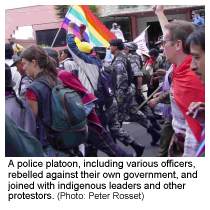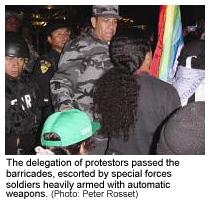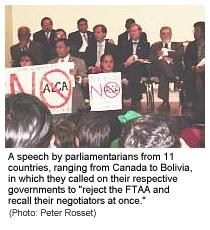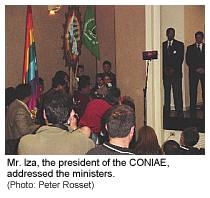Quito, November 1: The protests against the proposed Free Trade Area of the Americas (FTAA) --and the police violence that rocked Quito during the day yesterday--ended on a positive note for protesters in the evening, putting the Bush Administration's negotiator, Mr. Robert Zoellick, in an embarrassing and awkward position.
At about 3 PM yesterday, after the worst of the police violence against the tens of thousands of indigenous people, farmers, students and other members of civil society from the across the Americas had taken place, a police platoon, including various officers, rebelled against their own government, and joined with indigenous leaders and other protesters in demanding that the trade ministers from 34 countries meeting to negotiate the FTAA  agree to receive a delegation from the protesters carrying a declaration of opposition to the FTAA.
agree to receive a delegation from the protesters carrying a declaration of opposition to the FTAA.
According to sources, this news rocked a government that has seen two previous presidents thrown out of office by the indigenous movement in alliance with rebel security forces. At that point, the Ecuadorian government sent in the army to relive the police, on the one hand, and on the other, began to lean heavily on the trade ministers, and especially on Mr. Zoellick, the U.S. Trade Representative, to accede to the protesters demands.
As the popular movements re-grouped at Arbolito Park in the afternoon, the government extracted a reluctant offer from the ministers to receive a delegation composed of two representatives of the protesters. When the indigenous leaders of the CONIAE, Leonidas Iza and Blanca Chancoso, said no to the offer, the ministers came with an offer of ten. When that was refused they said that 30 people could come, but that too was refused, as was an offer of forty. The protesters finally accepted  to send a delegation of 50 people, over the strenuous objections of Mr. Zoellick, to be accompanied by the entire march up to the innermost security perimeter.
to send a delegation of 50 people, over the strenuous objections of Mr. Zoellick, to be accompanied by the entire march up to the innermost security perimeter.
At about 6:30 the delegation passed the barricades, escorted by special forces soldiers heavily armed with automatic weapons. Although the agreement was for a delegation of fifty, in fact 65 protesters managed to get into the Swiss Hotel where the historic meeting was to take place. The delegation included the top leadership of Latin America's most powerful social movements, including Iza and Chancoso from the CONIAE, Joao Pedro Stedile of the Landless Workers' Movement (MST) of Brazil, Rafael Alegria of the international farmers' movement, the Via Campesina, Juan Tiney of the Latin American Coordination of Rural Movements (CLOC), and many others. Also included were representatives of non-governmental organizations (NGOs) who work with these movements, like Peter Rosset of Food First and Nicola Bullard of Focus on the Global South in Thailand.
The delegation entered the basement auditorium of the hotel at the same instant as the 34 trade ministers, led by Mr. Zoellick. As the ministers sat down across the room, facing the protesters, Peter Rosset stood up and addressed Mr. Zoellick. "Excuse me," he said, "are you an American?" As Mr. Zoellick turned to see who was addressing him personally, Peter Rosset continued: "I am an American too, and I am ashamed at how you and the Bush Administration are trying to force Latin American governments to sign a trade agreement that will only bring them misery and poverty, and will bring the same to the American people." As the protesters applauded and some of the Latin American trade ministers smirked, Mr. Zoellick looked very  sour, at what was only the beginning of a very uncomfortable meeting for him. To add insult to injury, that night the Ecuadorian TV news stations showed Mr. Zoellick being told off by a fellow American in front of 33 fellow trade ministers.
sour, at what was only the beginning of a very uncomfortable meeting for him. To add insult to injury, that night the Ecuadorian TV news stations showed Mr. Zoellick being told off by a fellow American in front of 33 fellow trade ministers.
The next treat for Mr. Zoellick was a speech by parliamentarians from 11 countries, ranging from Canada to Bolivia, in which they called on their respective governments to "reject the FTAA and recall their negotiators at once." While the speech was being read, three congress people actually stood in front of Mr. Zoellick with placards reading "No al ALCA" (No to the FTAA).
A short time later, Mr. Iza, the president of the CONIAE, addressed the ministers. He began by saying, "Señores, I wish to say to you, not to offend, but only to speak the truth, that you cannot understand how the poor live in the Americas, because you were born in golden cribs." He then went one to humbly and movingly lay out exactly why the FTAA would mean "death to the indigenous peoples' of the Americas."
 This was followed by the powerful reading of protesters declaration, by Nicaraguan farm worker leader Maria Elena Siquiera. She began by saying "this is not a consultation or a dialog, this is a statement of implacable opposition to the FTAA by all the peoples' of the Americas." The declaration warned that "if you don't listen to our voices and those of millions more across the continent, you will be responsible for putting the very future of the Americas at risk." She concluded by shouting, "Yes to Life! No the FTAA! Another America is Possible!!!"
This was followed by the powerful reading of protesters declaration, by Nicaraguan farm worker leader Maria Elena Siquiera. She began by saying "this is not a consultation or a dialog, this is a statement of implacable opposition to the FTAA by all the peoples' of the Americas." The declaration warned that "if you don't listen to our voices and those of millions more across the continent, you will be responsible for putting the very future of the Americas at risk." She concluded by shouting, "Yes to Life! No the FTAA! Another America is Possible!!!"
At that point the ministers expected the delegation to stay for a photo opportunity with them, so they could claim they had "dialoged" with the protesters. But the protesters stood up with the final words of Ms. Siquiera and walked out, leaving the ministers looking like idiots in front of the dozens of news reporters filling the back of the room. Mr. Zoellick was not to be spared his final indignities, either, as Mr. Rosset said to him, in a voice that all could hear, "You know as well as I do that all opinion polls show Americans want no more free trade agreements, and you should be ashamed to go against the wishes of your own people."
Shouts of "shame on you!" came from the protesters. Even some journalists yelled "sell out!" while others said that Mr. Zoellick should be ashamed he doesn't speak Spanish. The whole meeting was translated for him via earphones. A protester spoke to the Latin American ministers, saying "have you no self-respect, that you accept the imposition of this guy who can't even speak our language?" All the media cameras immediately zoomed over to record the miserable expression on Mr. Zoellick's face, as several Lain American ministers tried to hide their smiles and chuckles behind their fists.
"After today's Seattle-like protests," concluded Mr. Rosset, "the U.S. government and the transnational corporations can never again claim that opposition to free trade comes only from a small group of northern environmentalists. It is abundantly clear that people from all walks of life, across all of Latin America, do not want anything to do with the FTAA, the World Trade Organization or any other manifestation of trade liberalization."
This morning the Ecuadorian papers reported on the protests and on the meeting with the ministers. They also noted that this weeks negotiations on agriculture within the FTAA had broken down over the Latin American governments' perception that the recent U.S. Farm Bill, which ups subsidies to corporate farmers, was a major breach of good faith. All in all, then, this was a very good few days for opponents of corporate globalization and trade liberalization.